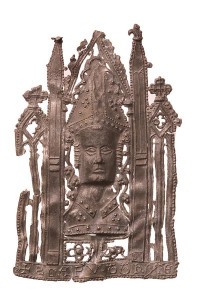
On this day in history, 17th December 1538, Pope Paul III announced that Henry VIII had been excommunicated from the Catholic Church:-
“Bull against Hen. VIII., renewing the execution of the bull of 30 Aug. 1535, which had been suspended in hope of his amendment, as he has since gone to still further excesses, having dug up and burned the bones of St, Thomas of Canterbury and scattered the ashes to the winds, (after calling the saint to judgment, condemning him as contumacious, and proclaiming him a traitor), and spoiled his shrine. He has also spoiled St. Augustine’s monastery in the same city, driven out the monks and put in deer in their place. Publication of this bull may be made in Dieppe or Boulogne in Fiance, or in St. Andrew’s or Coldstream (? “in oppido Calistrensi”), St. Andrew’s dioc., in Scotland, or in Tuam or Ardfert in Ireland, if preferred, instead of the places named in the former bull Rome, Paul III.”1
Henry VIII had already upset the Pope and the Catholic Church by:-
- Annulling his marriage to Catherine of Aragon and marrying Anne Boleyn
- Declaring himself “Supreme Head of the Church of England
- Persecuting those who opposed the Acts of Supremacy and Succession
- Dissolving the monasteries
- His handling of the Pilgrimage of Grace
But the final straw was Henry’s attack on religious shrines in England, shrines that contained religious relics and that were visited by many pilgrims. One such shrine was that of St Thomas Becket (Thomas à Becket) in the Trinity Chapel of Catherbury Cathedral, which was seen as one of Europe’s holiest shrines and was therefore a popular destination for pilgrims from all over Europe. In a meeting of the King’s Council on the 24th April 1538 a “Process against St Thomas of Canterbury” was decided:-
“Sentence to the effect that Thomas, formerly archbishop of Canterbury, having been cited, and no one having appeared for him, judgment is given that in his life time he disturbed the realm, and his crimes were the cause of his death, although the people hold him for a martyr. He is therefore never to be named martyr in future, his bones are to be token up and publicly burnt and the treasures of his shrine confiscated to the King. This edict to be published in London, Canterbury, and elsewhere. London, 11 June, 1538.
This sentence pronounced, the King commanded it to be put into execution 11 Aug. The gold and silver of the shrine (says Pollini) filled 26 waggons. On the 19th (St. Bernard’s duy), the sacrilege was completed and the sacred relics publicly burnt and the ashes scattered.”2
One treasure which was purloined by the King from the shrine was the Regale of France, a great ruby which was donated by King Louis VII, and Henry VIII had this made into a thumb ring for himself3.
Such desecration of a place which many pilgrims, and the Catholic Church as a whole, saw as holy could not go unpunished and it was this final act which made Pope Paul III issue the Bull of Excommunication.
Notes and Sources
- Letters and Papers, Foreign and Domestic, Henry VIII, Volume 13 Part 2. 1087
- Ibid., 133
- Canterbury Cathedral, article by Sacred Destination